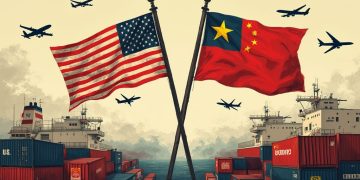China has announced a set of countermeasures in response to new U.S. tariffs, including a 34 percent tax on American goods and new restrictions on exports of certain rare earth elements. The measures mark a further escalation in ongoing trade tensions between the two countries.
On Wednesday, U.S. President Donald Trump unveiled a 34 percent tariff on Chinese goods, in addition to a 20 percent duty introduced earlier in the year. This brings the total new levies on Chinese imports to 54 percent.
In response, China’s Ministry of Finance stated on Friday that it would implement the additional tariffs starting April 10. These follow earlier duties, including a 15 percent tariff on U.S. coal and liquefied natural gas, enacted in response to U.S. actions.
Alongside the new tariffs, China also introduced a range of export controls targeting critical minerals. The Ministry of Commerce said the move is aimed at safeguarding national security and meeting international obligations, including non-proliferation commitments.
The list of restricted materials includes medium and heavy rare earths such as samarium, gadolinium, terbium, dysprosium, lutetium, scandium, and yttrium. These controls are effective from April 4.
Additionally, Beijing placed 16 U.S. firms on its export control list, limiting their access to Chinese goods and technologies. Another 11 U.S. companies were added to China’s “unreliable entities” list, a designation that may lead to restrictions on trade and investment in China. These actions included measures against firms involved in arms sales to Taiwan, which China considers part of its territory.
In the agriculture sector, Chinese customs authorities suspended imports of sorghum from C&D (USA) Inc., as well as poultry and bonemeal products from three other U.S. firms.
Separately, China launched an anti-dumping investigation into imports of certain medical CT scanner tubes from the U.S. and India, citing potential impacts on domestic industry competitiveness.
Beijing also filed a formal complaint with the World Trade Organization (WTO) regarding the latest U.S. tariffs. In a statement, China’s Permanent Mission to the WTO argued that the new levies violate international trade rules and requested consultations under WTO procedures.
U.S. President Trump addressed the developments on social media, stating in a post on Truth Social: “CHINA PLAYED IT WRONG, THEY PANICKED – THE ONE THING THEY CANNOT AFFORD TO DO!”
The economic fallout from the trade measures was visible across global markets. U.S. stock futures declined sharply on Friday, with major technology companies such as Apple and Nvidia—both with significant exposure to China and Taiwan—seeing losses in premarket trading. Analysts estimated that recent market volatility has erased approximately $2.4 trillion in value from U.S. equities.
Japan’s Prime Minister Shigeru Ishiba described the situation as a “national crisis,” as Japanese banking shares dropped sharply, contributing to Tokyo’s worst market week in years. European markets also experienced their steepest weekly losses in three years.
Despite the market response, U.S. Secretary of State Marco Rubio played down concerns of an economic downturn. Speaking in Brussels, he said the fluctuations were part of an adjustment to shifts in the global trade landscape.
“Their economies are not crashing. Their markets are reacting to a dramatic change in the global order in terms of trade,” Rubio said. “The markets will adjust.”
Your go-to source for supply chain logistics news updates: The Supply Chain Report. Enhance your international trade knowledge at ADAMftd.com.
#ChinaUSTrade #TariffResponse #ExportControls #TradeTensions #GlobalTradePolicy #USChinaRelations #EconomicRetaliation















